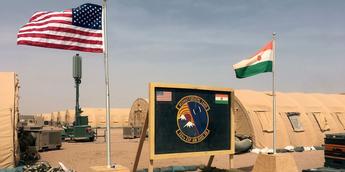The recent expulsion of the U.S. military from Niger by the country’s new junta has sent shockwaves through Washington, prompting a high-level visit and a scramble to salvage some semblance of American influence in West Africa.
General Brown Leads the Damage Control Mission
Air Force General C.Q. Brown, the Chairman of the Joint Chiefs of Staff, undertook a rare trip to Africa, specifically to Botswana, to meet with regional defence leaders. This visit underscores the seriousness with which the U.S. views the situation in Niger. General Brown acknowledged potential opportunities to rebuild the U.S. presence in West Africa by leveraging existing partnerships. He hinted at discussions with Benin, Ivory Coast, and Ghana as potential new partners to host American military capabilities.
Loss of Key Base a Major Setback
However, regaining the extensive counter-terrorism footprint established in Niger will be an uphill battle. The ejection from Niger signifies the loss of Air Base 201, a crucial facility constructed at a significant cost ($100 million+) and instrumental in the fight against regional insurgents. U.S. officials downplayed the possibility of replicating this large-scale military presence elsewhere in the near future.
READ ALSO: https://thecrux.com.ng/kenya-successfully-clears-2bn-eurobond-boosting-foreign-reserves/
Shifting Political Landscape Creates Challenges
The political turmoil in West and Central Africa, marked by a surge in coups (eight in the last four years), presents a complex dilemma for the U.S. The rise of military juntas, particularly in Niger, Burkina Faso, and Mali, has led these governments to distance themselves from Western powers due to restrictions on U.S. military cooperation with coup-installed regimes. This has opened the door for Russia, which faces no such limitations, to expand its influence in the region.
U.S. Re-evaluates Goals and Strategy
Analysts like Catherine Nzuki of the Center for Strategic and International Studies highlight the loss of a key regional partner in Niger. The U.S. State Department and Department of Defense are grappling with the rapidly evolving political landscape and the potential loss of allies. U.S. military officials are undertaking a strategic review to adapt to the changing environment and define “modified goals” for the region. A critical question remains: how effectively these modified goals can address the growing threat posed by Islamist groups in the Sahel region.
Russia Steps In as U.S. Departs
The U.S. withdrawal from Niger is on track for completion by September 15th, 2024. With only around 600 troops remaining at Air Base 101 near Niamey, the U.S. presence is significantly diminished. Russia has seized this opportunity, deploying its own military personnel to the vacated Air Base 101 for training exercises. U.S. officials have confirmed no interaction between American and Russian troops.
Hope for Future Engagement with Niger
General Brown expressed a cautious hope for maintaining some form of security cooperation with Niger in the future, acknowledging the long-standing military ties between the two nations. The U.S. embassy remains operational in Niger, offering a potential channel for future engagement. General Brown left the door open for rebuilding the relationship, subject to U.S. government approval.










